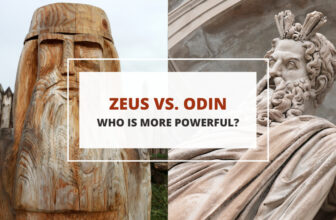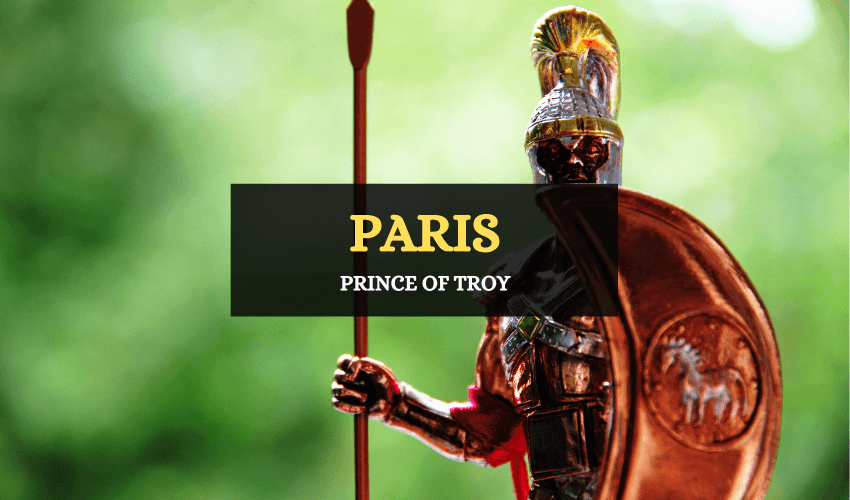
Table of Contents
The Trojan War, waged by the Greeks against the city of Troy, was one of the most important and well-known events in Greek mythology. It has been mentioned in several works of literature in ancient Greece, one of the main sources of the event being Homer’s Iliad.
Many believe that the war originated with the elopement of Helen, the Spartan queen, with Paris, the Trojan prince. However, while this may have been the match that lit the flame, the roots of the Trojan War go back to the wedding of Thetis and Peleus and a quarrel between three famous Greek goddesses. Here’s a closer look at the timeline of the Trojan War.
Peleus and Thetis
The story begins with a love contest between the gods of Olympus. Several years before the Trojan war began, Poseidon, the god of the seas, and Zeus, the king of the gods, both fell in love with a sea-nymph called Thetis. They both wanted to marry her but according to a prophecy, the son of Thetis by either Zeus or Poseidon would be a prince much stronger than his own father.
He would own a weapon that would be far more powerful than Zeus’ thunderbolt or Poseidon’s trident and would someday overthrow his father. Terrified at hearing this, Zeus had Thetis marry Peleus, a mortal instead. Peleus and Thetis had a large wedding and invited many important gods and goddesses to the event.
The Contest and Paris’ Judgement
Eris, the goddess of strife and discord, was outraged when she found that she wasn’t invited to Peleus and Thetis’ wedding. She was sent away at the gates, so to take revenge, she threw a golden apple to the ‘fairest’ goddess present. All three goddess, Aphrodite, Athena, and Hera tried to claim the apple and quarreled over it until Zeus acted as mediator and had the Trojan Prince, Paris, settle the problem. He would decide who was the fairest of them all.
The goddesses offered Paris gifts, each one hoping that he would choose her as the fairest. Paris was interested in what Aphrodite offered him: Helen, the most beautiful woman in the world. Paris chose Aphrodite as the fairest goddess, not realizing that Helen was already married to the Spartan king, Menelaus.
Paris went to Sparta to find Helen, and when Cupid shot her with an arrow, she fell in love with Paris. Together, the two eloped to Troy.
The Start of the Trojan War
When Menelaus discovered that Helen had left with the Trojan Prince, he was outraged and persuaded Agamemnon, his brother, to help him find her. All of Helen’s previous suitors had sworn an oath to defend Helen and Menelaus if ever the need arose, and Menelaus now invoked the oath.
Many Greek heroes such as Odysseus, Nestor and Ajax came from all over Greece at Agamemnon’s request and a thousand ships were launched to lay siege to the city of Troy and bring Helen back to Sparta. Thus it was that Helen’s face ‘launched one thousand ships”.
Achilles and Odysseus
Odysseus, together with Ajax and Phoenix, one of Achilles’ tutors, went to Skyros to convince Achilles to join forces with them. However, Achilles’ mother didn’t want him to do so for she feared her son would never return if he joined the Trojan War, so she disguised him as a woman.
In one version of the story, Odysseus blew a horn and Achilles at once seized a spear to fight, revealing his true self. An alternate version of the story tells of how the men diguised themselves as merchants selling weaponry and trinkets and Achilles stood out from the other women for showing interest in the weapons rather than in jewelry and clothes. They were able to identify him at once. In any case, he joined the forces against Troy.
The Gods Choose Sides
The gods of Olympus took sides, intervening and assisting during the events of the war. Hera and Athena, who bore grudges against Paris for choosing Aphrodite, sided with the Greeks. Poseidon also chose to asissist the Greeks. However, Aphrodite took the side of the Trojans along with Artemis and Apollo. Zeus claimed that he would remain neutral, but he secretly favored the Trojans. With the favor of the gods on either side, the war was bloody and long.
The Forces Gather at Aulis
The Greeks had their first gathering at Aulis, where they made a sacrifice to Apollo, the god of the sun. Afterwards, a snake from Apollo’s altar found its way to a sparrow’s nest in a nearby tree and swallowed the sparrow along with her nine chicks. After eating the nineth chick, the snake turned to stone. The Seer Calchas stated that this was a sign from the gods, that the city of Troy would fall only in the 10th year of siege.
The Second Gathering at Aulis
The Greeks were ready to set sail for Troy, but ill winds were holding them behind. Calchas then informed them that the goddess Artemis was displeased with someone in the army (some say it was Agamemnon) and that they would first have to appease the goddess.
The only way to do this was by sacrificing Agamemnon’s daughter Iphigenia. When they were about to sacrifice Iphigenia, the goddess Artemis took pity on the girl and took her away, substituting a lamb or a deer in her place. The ill winds abated and the way was clear for the Greek army to set sail.
The War Begins
As the Greeks reached the Trojan beach, Calchas informed them of another prophecy, that the first man to step off the ships and walk on land would be the first to die. Hearing this, none of the men wanted to land on Trojan soil first.
However, Odysseus convinced Protesilaus, the Phylacean leader, to get off the ship with him and tricked him into landing on the sand first. Protesilaus was soon killed by Hector, prince of Troy, and the Trojans ran to safety behind their strong walls, to begin preparing for war.
The Greek army raided the Trojan’s allies, conquering city after city. Achilles captured and killed young Troilus, a Trojan prince, due to a prophecy which stated that Troy would never fall if Troilus lived to be 20 years of age. Achilles conquered twelve islands and eleven cities during the Trojan War. The Greeks continued to besiege the city of Troy for nine years and still its walls held firm. The city’s walls were immensely strong and were said to have been built by Apollo and Poseidon who had to serve Leomedon, the Trojan King for a year because of an impious act on their part.
Paris Fights Menelaus
Helen’s husband, Menelaus, offered to fight prince Paris so that the issue of the war could be settled between the two. Paris agreed, but Menelaus was too strong for him and very nearly killed him in the first few minutes of the fight. Menelaus grabbed Paris by his helmet but before he could do anything more, the goddess Aphrodite intervened. Sh covered him in a thick mist, spiriting him back to the safety of his bedroom.
Hector and Ajax
The duel between Hector and Ajax was another famous event of the Trojan War. Hector threw an enormous rock at Ajax who defended himself with his shield and then threw a bigger rock at Hector, smashing his shield to bits. The fight had to be discontinued since night was approaching and the two warriors ended it on friendly terms. Hector gave Ajax a sword with a silver hilt and Ajax gave Hector a purple belt as a sign of respect.
The Death of Patroclus
In the meantime, Achilles had quarreled with Agamemnon, for the King had taken Achilles’ concubine Briseis for himself. Achilles refused to fight and Agamemnon, who didn’t seem to mind at first, soon realized that the Trojans were gaining the upper hand. Agamemnon sent Patroclus, Achilles’ friend, to convince Achilles to return and fight but Achilles refused.
The Greek camp was under attack so Patroclus asked Achilles if he could wear his armor and lead the Myrmidons in the attack. Some sources say that Achilles reluctantly gave Patroclus permission to do this but warned him only to drive the Trojans away from the camp without pursuing them to the city’s walls. However, others say that Patroclus stole the armor and led the attack without informing Achilles first.
Patroclus and the Myrmidons fought back, driving the Trojans away from the camp. He even killed Sarpedon, the Trojan hero. However, feeling elated, he forgot what Achilles had told him and led his men towards the city where he was killed by Hector.
Achilles and Hector
When Achilles discovered that his friend was dead, he was overcome with anger and grief. He swore to take revenge on the Trojans and end Hector’s life. He had new armor made for himself by Hephaistus, the god of the blacksmiths, and stood outside the city of Troy waiting for Hector to face him.
Achilles chased Hector around the city’s walls three times before he finally caught him and speared him through the neck. Then, he stripped Hector’s body of its armor and tied the prince by his ankles to the chariot. He dragged the body back to his camp, while King Priam and the rest of the royal family watched his shocking and dishonorable actions.
King Priam disguised himself and entered the Achaean camp. He begged Achilles to return his son’s body so that he could give him a proper burial. Although Achilles was reluctant at first, he finally consented and returned the body to the king.
The Deaths of Achilles and Paris
After several more interesting episodes, including Achilles’ fight with King Memnon whom he killed, the hero finally met his end. Under the guidance of Apollo, Paris shot him in his only weak spot, his ankle. Paris was later killed by Philoktetes, who avenged Achilles. In the meantime, Odysseus disguised himself and entered Troy, stealing the statue of Athena (the Palladium) without which the city would fall.
The Trojan Horse
In the 10th year of war, Odysseus came up with the idea of building a large wooden horse with a compartment in its belly, large enough to hold several heroes. Once it was built, the Greeks left it on the Trojan beach with one of their men, Sinon, and they pretended to sail away. When the Trojans found Sinon and the Wooden Horse, he told them that the Greeks had surrendered and left the Horse as an offering for the goddess Athena.
The Trojans wheeled the horse into their city and celebrated their victory. At night, the Greeks climbed out of the horse and opened the gates of Troy for the rest of the army. The city of Troy was sacked and the population was either enslaved or slaughtered. According to some sources, Menelaus took Helen back to Sparta.
Troy was burned to the ground and with it ended the Trojan War. The War went down in history as one of the most famous wars along with the names of all those who fought in it.
Wrapping Up
The Trojan War remains one of the most important events of Greek history, and one that has inspired countless classical works across the centuries. The stories of the Trojan War demonstrate ingenuity, bravery, courage, love, lust, betrayal and the supernatural forces of the gods.








